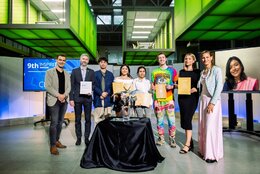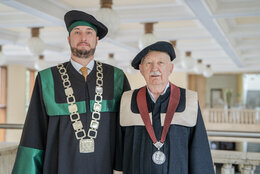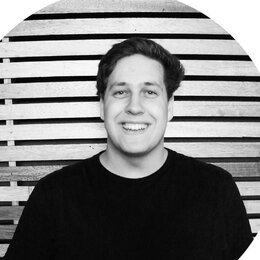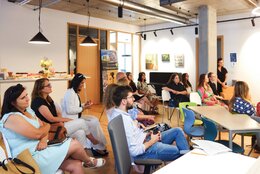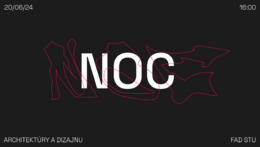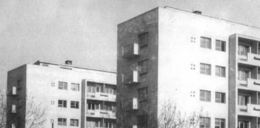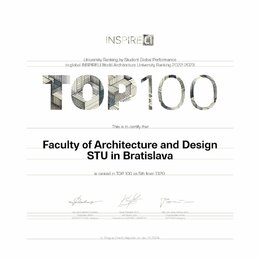Dear student
We welcome you to our Alma Mater and we are very happy that you will be part of our team!
Our faculty is small but full of enthusiasts for architecture, urbanism and design. We all know each other at least visually and during the various interesting activities that we organize together with your colleagues, you get to know everyone much more, you get to know their opinions, their work and you get to ask them everything that interests you. We are already looking forward to you becoming a visitor and possibly an organizer of Prieskum (semestral exhibition of students' works), Night of Architecture, Pechtle Mechtle, Pajc, Belluš open, Manifesto, Photo expo, etc.
Many things will be new for you, you may not know how to study at our faculty, what are the study plans, where to find answers to your questions, what is the difference between an exam and a graded credit, what is a studio or study credit system, etc.
We have summarized the most important answers for you and we will try to explain them to you on this page.
We firmly believe that in this way we will help you better orientate yourself on FAD, save you a lot of time in finding the right answers and make it easier for you to start your studies.
FAD
Courses take place mainly in the FAD building on Námestie Slobody 19, Bratislava. Design students also use the studio space at the STU Rectorate on Vazovova ulica.
Sometimes, to the great popularity of students, a detached workplace in Banská Štiavnica is also used for teaching, e.g. during plein air. Maybe some of your classmates or you yourself visited it during the introductory week at FAD STU.
Today's building of the Faculty of Architecture and Design STU on Námestí slobody 19 was designed by a prominent Slovak architect, whose name you will meet many times again - professor, founder of architectural education in Slovakia, former dean of FA, architect Emil Belluš.
The building is open daily for our students from 7.00-22.00, during the studio week NON STOP - from 0.00-24.00 (only after 22.00 it is necessary to report to the gatehouse)
Who is who? What is what?
During your studies you will hear terms such as rector, dean, guarantor, academic senate… For many these names sound interesting and for some mysterious. Individual titles come from the Act on Higher Education Institutions and are often common to foreign ones.
Above the whole STU / which consists of 7 faculties / is its top representative - a rector, currently prof. Ing. Miroslav Fikar, DrSc., whose "right hands" are the vice-rectors and the quaestor.
The highest representative at the individual faculties is always a dean.
At FAD STU it is prof. Ing. arch. Pavel Gregor, PhD.
Together with him, the management of the faculty forms a comprehensive team consisting of vice-deans and the secretary:
- Ing. Michal Brašeň, ArtD. - Vice-Dean for Strategic Projects, PR and Social Affairs, and Statutory Representative,
- doc. Ing. arch. Danica Končeková, PhD. - Vice-Dean for Education
- Ing. arch. Ján Legény, PhD. - Vice-Dean for Science and Research
- Ing. arch. Peter Morgenstein, PhD. - Vice-Dean for International Relations and Development
- Ing. Anna Karácsonyová - secretary
Guarantors cover study programs or individual subjects. They are mainly responsible for the content and quality of teaching that must meet the requirements of the Accreditation Commission.
How does it work at FAD?
We would like to briefly explain to you how to study at our faculty and who to contact. Maybe at the beginning you will feel lost but don't worry, you will quickly understand how everything is organized and you will soon orient yourself in it. And in case you'll have any doubts, have a look at this guide or simply ask at the study department.
Study Department
serves directly to you - FAD STU students, guides you throughout your studies and provides help and support to students.
Each year of study is assigned to one employee that will accompany you throughout your studies and over time will know a lot about you and your progress. If you have a problem, stop by them during office hours and they will look for a solution or pass the information to the vice-dean or to the coordinator for students with specific problems. If you can't come, write to them at: study.fad@stuba.sk
Academic Year
is similar to the high school year. Courses begin around September 20th and end no later than early July. If you're handy you can finish them even sooner :)
It is divided into 2 semesters - winter term and summer term. Each term consists of a teaching period - at least 12 weeks and an exam period of 6 weeks.
Credits - how to get them?
Each subject has an assigned number of credits in the study program, which the student will receive after its successful completion / the amount of credits depends on the range and difficulty, ie. from the amount of time you should devote to it. You can get 30 credits for each semester and 60 credits for the academic year. You always see the number of credits for each subject you will subscribe to.
In order to continue your studies, you must obtain at least 20 credits for the 1st semester of your bachelor study, 40 credits for the first academic year of your bachelor study and then at least 30 credits for each academic year.
During your bachelor studies you have to collect at least 240 credits and during your master studies at least 120 credits.
Always subscribe only to courses you plan to complete. In case you have problems following all of them or you are missing some credits to advance to the next study, consult it with the study department.
For first-year students it is necessary to obtain a min. 20 credits in order to progress to the summer semester and for the whole academic year 40 credits. A student who does not obtain the required number of credits or does not successfully complete the repeated course will be excluded from the study.
What courses to study?
As in high school, it is necessary to complete certain subjects during your studies. It is divided into:
- mandatory courses - which are prescribed
- compulsory optional courses - which must be completed but may be different for each study program
- optional courses - which you choose according to your interests. You subscribe to them in addition to the required courses, even outside your field or program, because this way you can enrich your studies.
As a student, you compile your study plan, which you approve by enrolling. If you want to make changes in it, delete the subjects, you can do so within 10 working days from the beginning of the semester. Warning! You are responsible for its accuracy and for the mandatory continuity of courses / so-called prerequisites.
If you are seriously ill or you have another serious problem, you can ask the dean for an individual study plan or you can always extend your studies by max. 2 years for each degree. Just beware, above-standard study is already charged!
Prerequisites:
The courses included in the study program are divided into
- courses conditioned by a successful completion of other subjects; enrollment of such a course is conditioned by a successful completion of another course (prerequisite - conditional course)
- unconditioned courses; enrollment of such a course is not conditioned by a successful completion of another course
The state exam is considered an individual course.
For more information on courses and their requirements, first contact the lecturers, the tutors of studios or the guarantors of courses. To obtain general information about the study, or specific applications / interruption of studies, problems with credits, scholarships / contact the study department by person / telephone during office hours or by email: study.fad@stuba.sk
Other information and contact persons are listed on the FAD or STU website.
You can contact any lecturer or other employee at the following e-mail addresses: name.surname@stuba.sk or via AIS.
How are the courses organised?
At the University you will experience a different system of education. You will attend some of the lectures together with all of your year-classmates and sometimes you will meet only as a small group.
Most of the lectures are held in the hall 001, where the professor will explain to you theoretical basic information but also those that you do not find in books or scripts.
The seminaries are usually held within a study group but some of them are organised for the whole year-class. During the seminaries you will expand information, practice the knowledge learnt during the lectures and apply it. If the schedule of seminaries does not suit you, and you would like to change the study group, talk to your teacher and a solution will definitely be found.
The studios are probably the most interesting and the most beautiful part of the study.
This is where your theoretical knowledge takes its shape. You will design small family houses, civic buildings, public spaces, urban units and also interior accessories. Students of Design will learn to develop their ideas, look for a connection between 3D and 2D, acquire skills and learn to work with materials. At the end of the semester, we always present all the results of your work and celebrate it with Prieskum and the Night of Architecture.
Plein air is a comprehensive workshop of students and teachers usually held in Banská Štiavnica and focused on drawing outside. You will get registered for the individual plein air dates.
All these forms of education are compulsory for students.
Unfortunately, we only have limited physical space at the faculty and it is not possible for everyone to have their own work desk at school. For this reason, during the first three years of study, the students of architecture will mostly be assigned to a studio and the tutor. Since the fourth year you will be able to apply directly for individual studios and tutors. These are the so-called vertical studios, where you will work together with colleagues from other grades on a joint assignment or at least in a common space. Students of design, since there are fewer of you, you have an advantage and you will be part of vertical studios earlier.
How to complete a term or a course?
The courses get completed after the end of the lectures part during the examination period. This time is specially set aside in the semester schedule and by then you should have all the work completed and submitted because it is a time intended only for the preparation for exams.
Older students consider it an easier part of the semester because once you hand over all of your assignments you can finally get some sleep and “just” study for the exams :)
In the course information sheet there is always defined how to complete the course. Sometimes you simply attend the course and hand over your assignments to get the credits other times an exam is necessary. All studios end with a public presentation where a jury marks your work with classified credits.
You can repeat any exam once more if you fail. If you do not succeed the second time you can try it again in a year and you can apply for the recognition of your previous credit.
You register for the exams via the AIS system and you choose the exam dates yourself.
Examinations are performed in
- written form - a test filed physically or online
- oral form - an interview with the teacher
- combined form
The teacher is obliged to notify the student of the evaluation within 3 working days (mostly via AIS). The student has the right to accept or reject the evaluation.
Classified credit is a form of completion of the course. The difference to the credit is that a classified credit evaluates the student according to predetermined criteria with a mark. If the student does not obtain a classified credit, he or she is obliged to complete the course in the following academic year.
Absence
Studying at the university means that all forms of study are compulsory for you and it is necessary not only to participate at them but also to be prepared for them. If you come unprepared it will not be possible for you to consult your assignment / work / proposal and you will be granted absence.
All absences must be justified and you can compensate them by joining another students group for the meeting you missed. Non-participation in the compulsory form of education must be justified. If you have been absent for more than 1 day, it is necessary to report the absence at the study department within 3 working days. A short absence can be justified directly by the teacher.
Presence in class with unproven or inadequate class preparation is counted as absence.
Submission of studio works
The date of submissions is listed in the study schedule and you should remember it very well. In the beginning of semester all of the students receive a studio work assignment at once and at the end of semester are obliged to upload it to AIS ( or to another virtual depository) at once. Don't wait with the uploading to the very last minute as it may take a long time for you to load the files!
In case you do not make it, contact your tutor as soon as possible at name.surname@stuba.sk explaining the situation and include the course guarantor in the copy of email. In case you cannot submit your work because of any serious reason, contact the study department and apply for the submission postponing. The postponing must be confirmed by your tutor, the guarantor of the course and the vice-dean.
How do you get evaluated?
Just as before, by marks. In order to be a successful student, you must master at least 56% of the required knowledge. We use a range: 1-A, 1,5-B, 2-C, 2,5-D, 3-E. Several students think that the mark worse than A should not exist. The opposite is true. If everyone would always receive only an A, we wouldn't have to study. And hand on heart, what grades did you have in high school? You study to gain knowledge and not for passion of collecting the “A”s. Let the lower marks motivate you, compare your work to others and try to improve constantly.
If you do not master a course, you have the right to repeat it again for the next academic year. You are not entitled to a correction of courses that end up with the classified credit, as your semester work is evaluated. Be careful about the prerequisites, because their non-fulfillment may prevent you from studying the following course next year.
evaluation
|
mark |
percentage |
numeric scale |
note |
|
A |
100–92 |
1 |
excellent (excellent results) |
|
B |
91–83 |
1,5 |
very good (above average results) |
|
C |
82-74 |
2 |
good (average results) |
|
D |
73-65 |
2,5 |
satisfactory (acceptable results) |
|
E |
64–56 |
3 |
sufficient (results meet the minimum criteria) |
|
Fx |
55–0 |
4 |
insufficient (further work required) |
The evaluation of the student's results within a course is carried out by a
continuous control during the studying part of the term
(work-in-progress checks, tests, papers or an examination for a given period of study).
Study interruption
Yes, this also happens and it is not a disaster. Sometimes, with regard to health, life situation, necessary time to think about the next steps in life, or a good job offer, you are forced to interrupt your studies. During the first year, only really exceptional reasons get approved by the dean of the faculty. In other years, of course, you can also find possible reasons in the study regulations, or consult the head of study department. Remember that during the break you do not have the status of a student, you cannot take exams, hand over work, live at the campus or use student discounts.
It is not possible to interrupt the study at the end of the semester or during the examination period (of course, there may also be extremely specific situations). You can interrupt the study for the maximum of 2 years. If you do not return by then, your studies will be terminated.
AIS / Academic Information System
is a university-wide system managed by STU, which makes a lot of information available to the academic community, university staff and the general public. For example the evaluation records, sending information, information sheets about the courses and study programs, documents for courses, submission of works, etc. In case of problems, contact our integrator, Mr. Ing. Tichý at robert.tichy@stuba.sk
AIS is considered a little nightmare among students and actually, even among teachers, but only at the beginning! You will quickly orient yourself, find courses and necessary study information about the tutors, exams, submissions etc. Due to its limited capacity, we also use storage capacities of Google G-Suite / Google Classrooms. Your tutor will inform you about the use of G-Suite all you have to do is to follow the instructions.
email address assigned in AIS
With the help of this email addresses students communicate their matters related to the study at FAD or STU. FAD students are reminded to check and clean their mailbox on an ongoing basis (including the basket), as the mail will not be delivered when the mailbox is overfilled. If you are interested in contacting a teacher or an employee of FAD STU, it is necessary to use only the email address name.surname@stuba.sk . Teachers and other STU employees do not have to respond to personal emails. Failure to fulfill your obligations due to undeliverable information will not be justified.
AIS password
For security reasons each student must have an access password, which must comply with the prescribed common conditions for a sufficiently strong password. If you need to change the password, e.g. after expiration, you can do so via AIS (in personal administration - password recovery).
Portfolio
is that interesting collection that you present yourself with during your studies! After completing the studio course archive your work in the prescribed A3 format and make sure it contains the titles of the drawings, the name of the course, year, your name, name of your tutor and the guarantor. Each portfolio must be signed by the tutor after the final presentation and stamped by the institute at which it was prepared. You will later use this portfolio during state exams, when the commission will ask you questions about your proposals. But don't worry, it's natural that the graphics and expression of your 1st grade portfolio is much weaker than the last one. That's how the commission can see your progress.
Electronic index
At the university you have an electronic index at your disposal, which fully replaces the originally used classic physical index. It indicates courses, values, marks, credits, classified credits.
Accomodation
FAD students are primarily accommodated at the Belojanis college about a 10-minute walk from the school. It belongs exclusively to the faculty and there is also a drawing room inside. Secondary we use the college at Jura Hronca - called “Bernolák”, Mladosť or Mladá garda.
We try to provide accommodation to all the 1st grade students and to the 4th and 6th grade students that are about to finish their studies. Other rooms are divided in between the rest of the students according to the study average and additional points obtained. These are obtained during the year and you get them by helping your faculty. Of course, students with special needs or difficult family situations also receive the points after providing the necessary documents. Please study the accommodation criteria carefully and get informed about the positive points, which will move you higher in the ranking.
Once you get accommodated at the college pay attention to the accommodation rules, required payment as well as the actual registration in the reservation system.
The accommodation system "Accommodation STU" for the academic year 2020/2021 is launched on 1.6.2020. Students interested in accommodation must submit an electronic application for the allocation of accommodation in the system https://ubytovanie.stuba.sk by 15.7.2020 (does not apply to newcomers).
The electronic submission of an application for the allocation of accommodation is valid for all bachelor, master and doctoral students (except for foreign students who apply by writing to the Special Purpose Facility STU Student Homes and Canteens).
The system does not yet allow anyone with a permanent residence in Bratislava to apply.
After submitting the application, the system will automatically calculate a point rating for your studies, time availability as well as a social scholarship according to the "Criteria for allocating STU accommodation".
At the same time, we notify you in advance of automatic cancellations of accommodation if:
1) the student does not reserve a room within the set deadline from the allocation of accommodation,
2) after the approved reservation for the 1st and 2nd round, the student does not pay the price for accommodation until 31 August,
3) a student whose room reservation has been approved only since September will not pay the price for accommodation within 5 working days from the approved reservation.
Students organizations
The student parliament /www.spfastu.sk/ operates at the faculty and it covers enthusiasts from areas of Architecture, Urban planning and Design. This is where you'll find people who always put their hand to the work, come up with new ideas, organize various events, meetings, lectures, build temporary constructions, invite practitioners or art enthusiasts. Without them, life at the faculty would be sad. They always need more people interested in all the ideas, so they will be very happy if you contact them. These students are creative and often skilled. Thanks to them we have a floor in the boiler room or in the past they renewed the faculty house in Banská Štiavnica. By putting our heads and hands together we can do so much and make the faculty much nicer and better!
Events at FAD STU
You probably heard about them already since they are also known outside of the faculty building and are regularly visited by the public. We organize Prieskum (a presentation of students semestral works), Night of Architecture (a ceremonial opening of Prieskum with interesting guests and prize for the best semestral work CHEDDAR), lectures and discussion forums Pechtle Mechtle, Pajc, magnificent Prize of the dean, or Manifesto festival, Belluš open, Belluš blood donation, FotoExpo and many others. We invite you to all of them!
How do we communicate?
The students' opinion is important to govern our faculty. Every Tuesday there are 2 hours, when you do not study at school and if you are interested, you can meet the teachers. At that time, discussion forums such as Coffee with Dean and Coffee with Vice-Dean are held several times a semester. They create open discussion forums where everyone is welcomed and can discuss anything without worries. If you still have trouble asking something out loud, the anonymous asking of questions and suggestions is also prepared.
We also create a discussion forum on the faculty's website and you can evaluate courses or studios through evaluation forms. Your feedback can strongly improve the faculty!
Important legislation
The legislation is usually not popular but it determines what to do and how to do it. For this reason it is sometimes necessary to reach for it. For example, the FAD STU or STU Study Regulations available on the webpage can answer some of your questions. There you can find information about the possibility to continue your studies, about marks, about credits, about transfers ... For example the University Act (Act 131/2002 Coll.), Or Decree 614, MINED of the Slovak Republic on the study credit system, (sept. 2002).
Software tools
There are several free platform services available to all of the students during their studies. We all use G-suite / google classroom, google meet, jamboard, unlimited disk storage /. You can register to G-suite via the assigned university address https://www.stuba.sk/navody Your address is identical with AIS address, but @ is followed by stuba.sk /xnovak@stuba.sk/ It is also possible to set forwarding of your AIS mails to gmail. This will make it easier for you to get information quickly.
In addition, the faculty offers you free access to various softwares that will help you with drawing, 3D modeling, visualizations, etc. Just log in to them using your current ISIC card.
Personal life during your studies
By starting to study at FAD a lot will change in your life. You will spend most of your time by the computer or by sketching, drawing or sitting at school. You will not have lessons only in the morning and also not always together in one block. You will work a lot at night and for the first time many of you will live outside your parents' house. You will probably have much less free time and experience more stressful situations. Therefore, it is necessary not to forget about your health and lifestyle and sport.
To sport or not to sport?
Don't forget about the physical exercise! At our faculty, sport is not a mandatory part of education but at other faculties and colleges there are sports areas available. You can attend sports as part of your studies or attend them during the courses offered by individual faculties that are usually for a symbolic fee. If you are interested, see the STU - student life page.
If you are good at sports and you would like to regularly improve your performance you can become a reinforcement of one of the STU teams.
What to do in difficulties?
In case of any personal doubts or problems please consult your situation with us. Timely communication is always important! It is often then possible to do small steps and prevent the possible consequences. You can always contact the study department, the vice-dean for education or the coordinator for students with specific problems and you will see that a solution can be found. You just have to say it! We also have a nice psychologist at the Rector's Office, so please contact her: btrimaj@hotmail.com, poradenske.centrum@stuba.sk , tel. +421 917 559 820
Students with specific needs
All talented applicants have the same opportunity to study at our faculty. When someone can't hear or is in a wheelchair, it doesn't mean that architecture or design are not for them. At FAD it is Mrs. doc. Čerešňová, which directs, helps or informs other colleagues how to approach specific needs (according to the agreed anonymity). You can visit her on the 4th floor in the right wing of the building in person or contact her at: zuzana.ceresnova@stuba.sk
Coordinator for students with specific needs can also be sought by other students with health or mental problems who rest in the required anonymity. In case you have problems, it is necessary to communicate about them in time and the assigned persons will try to find the most suitable solution for you!
What to eat?
Many of you came from an environment where home-cooked food was the order of the day. Diet is still very important and you do the best if you limit all kinds of junk food. You have at your disposal canteens both at the college and at the university - e.g. at the Faculty of Mechanical Engineering, Civil Engineering or Chemistry and it is just across the road. But don't forget about fruits, vegetables or nuts, they will also help you while learning. We advise you to limit the drinking of caffeine and energy drinks. Once you develop bad habits it's difficult to get rid of them.
What tools will you need?
For smooth work with softwares for architectural and design creation it is advisable to pay attention to the minimum system requirements when choosing a laptop or computer. Each software defines them a little differently, but in principle it is advisable to choose a PC with a 64-bit processor with at least four cores (Intel i5 and higher, or equivalent AMD Ryzen processor), at least 8 GB RAM (optimally 16 GB and more). Hard disk - HDD select optimal 7200 / rpm (revolutions per minute). If the budget allows, it is advisable to choose SSD (eg 250GB) rather than HDD, even smaller capacity is enough, because as a STU student you automatically have Google Drive unlimited cloud storage.
It is advisable to choose a dedicated graphics card with at least 2GB + VRAM with DirectX 11 and OpenGL 4.0 (e.g. nVidia GeForce GTX 1050 or equivalent). For a more comfortable work and the well-being of your cervical spine it is recommended to buy a laptop for example a 24inch monitor with at least Full HD resolution and adjustable monitor height. Although development in this area is progressing relatively fast, such a set should last you at least for the duration of your bachelor's degree.
If you currently have a computer that does not fully meet the recommended parameters, it is not necessary to change it immediately. You will definitely be able to do the basic things on it and at least you will better check which programs suit you and you will be able to choose the right configuration.
In addition to notebooks for writing notes from lectures you will need a Duplex roll of tracing paper for architects, a soft B-pencil and thin black Rotring pens-markers, the A4-A5 blocks for sketching, an A2 drawing board, markers - ideal brush monochrome with additional 2-3 colors / e.g. Touch or Copic. When buying a ruler choose the one with the parallels and a protractor marked on it in addition to the line. We cut papers, cartons with cutters on A3 cutting mats.
You can also buy duplex, pencils and cutting pads directly at the faculty.
Library
There is a library at your disposal at the faculty. Here you can find not only scripts, but also interesting publications, magazines and printed standards. The library's interest is to provide students with information about what they are studying. All you have to do is to come, register and reach for a good book :)


